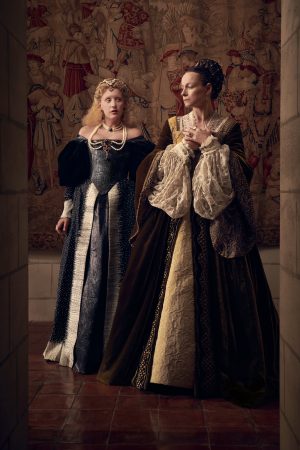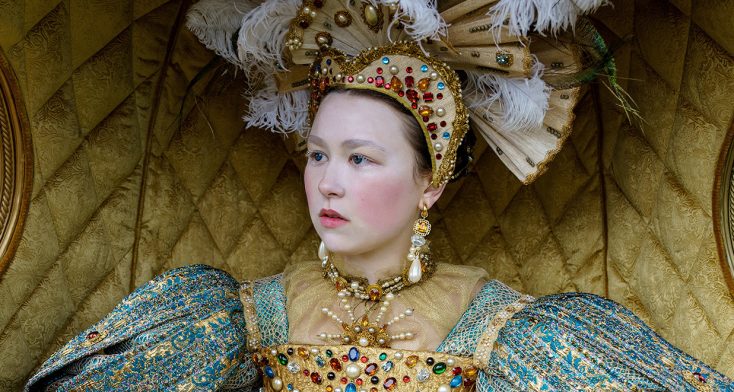
(l-r) Diane (Ludivine Sagnier) and Catherine De Medici (Samantha Morton in THE SERPENT QUEEN. ©Starz. CR: Jason Bell.
By JUDY SLOANE
Front Row Features
HOLLYWOOD-Based on the book Catherine de Medici: Renaissance Queen of France by Leonie Frieda, Starz’ new 8 part series “The Serpent Queen,” premieres on Sunday, September 11, 2022.
Starring Liv Hill and Samantha Morton as Catherine, respectively younger and older, the drama tells the story of one of the world’s most powerful and enduring leaders.
Born in Florence, Catherine de Medici, at 14 years old, was sent to France by her uncle, Pope Clement, for an arraigned marriage to Henry, Duke of Orleans, who became King Henry II. When Henry dies, she must fight for the crown destined for her young children, with Catherine acting as regent.
Known as The Serpent Queen for her persona and the lethal use of poison, this new series tells the story of Catherine through her own eyes by writer, creator and showrunner, Justin Haythe. Haythe, along with Samantha Morton and Liv Hill joined the TV Critics Association digitally to talk about their new series.
Q: Justin, Catherine in history is framed as a villain. I’m curious, what inspired you to take her story and put it in her own words?
Justin Haythe: It’s a great question and it was part of the motivation for doing it. Because I liked the idea of a villain from history who would address us and say, “Let me tell you why I did the things I did,” and you’ll judge me differently.
I think that the idea of the show is you have to look at Catherine, both young and old Catherine, and really wonder if this is an evil person with shards of good or if it’s a good person who’s capable of evil to survive.
That’s my interpretation of Catherine because she outlived all these kings and she was supposed to be just a mail-order bride. She ended up ruling over everybody. I also think that she’s defined by heartbreak, which can look evil from a certain angle.
Q: Samantha and Liv, it always intrigues me when two actresses share a role, especially one as well-known and famous as this one. Did you work from the same research material? Did you talk with each other about what nuances you both would give Catherine?
Samantha Morton: We obviously had the same script, conversations with Justin and Stacie Passon, who was directing, and then luckily we got the time together on Zoom. We were shooting this in times of the lockdown COVID so it was really tricky for us to meet outside of that. So we spoke on Zoom about how it must feel for Catherine, talking about her childhood, talking about the religious aspects, and also connecting as actors.
Liv Hill: Yeah, exactly. We also had a really fantastic voice coach, Nia, who seemed more like an acting coach in many ways. I don’t know if she told you, [Samantha], but she found common links and essences that we both had and just allowed us to embrace that in our voice, in our work.
Morton: I didn’t want Liv to feel that she had to be stuck to anything. I wanted her to have complete freedom so that when I came aboard Catherine had this strength of character [and] that she was so individual.
I didn’t watch any of the footage before playing old Catherine; it was trusting in the casting process and trusting in Liv and Liv trusting in me. Liv’s extraordinary in this role.
Hill: Thank you, you too. I would say just very quickly, that one of the best things for me, when I briefly met Samantha, is when she said to me, “I’m so glad that they chose you and I’m really excited,” because it just gave me that, okay, I don’t have to do an interpretation, an imitation of you. We can just trust each other, which was really lovely of you.
Morton: I think that people do change enormously from [being] 14 to [being] in your 30s and 40s, but not so much in their spirit. There’s a real similarity [with] Liv and I that if you haven’t seen the show yet, I really hope you [notice] when you see it.
Q: Justin, we know that Catherine is not concerned about the judgment of her peers. What did she care about?
Haythe: Part of the reason I was attracted to Catherine is I think she’s a really modern character. She’s incredibly practical. She didn’t care about people’s judgment. But she was highly concerned with perception. I think she was brilliant at managing perception. How do you rule and intimidate if you’re not big [and] strong? You manage your image.
She was the first to dress in black in mourning. She was always in black. It looked good. She promoted, I think, “The Serpent Queen” image. I saw this as a very practical, very modern story for someone who just happened to be born in the 16th century.
She is the basis of the evil queen in “Snow White,” according to a lot of people, and I wonder in the dark of night as her life went on, as she made more and more of the shrewd moves she had to survive, if she wondered if there was some judgment. But that’s a highly internal thing and that moves me about her, how much she had to give up. Catherine was not royal, not a beauty, not rich; she was an orphan suddenly thrown into the affairs of court and not only survived but ruled France longer than any monarch.





